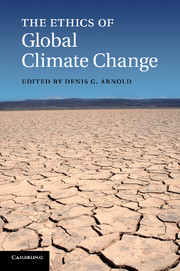Book contents
- Frontmatter
- Contents
- List of illustrations
- List of contributors
- Acknowledgements
- Introduction: climate change and ethics
- 1 Energy, ethics, and the transformation of nature
- 2 Is no one responsible for global environmental tragedy? Climate change as a challenge to our ethical concepts
- 3 Greenhouse gas emission and the domination of posterity
- 4 Climate change, energy rights, and equality
- 5 Common atmospheric ownership and equal emissions entitlements
- 6 A Lockean defense of grandfathering emission rights
- 7 Parenting the planet
- 8 Living ethically in a greenhouse
- 9 Beyond business as usual: alternative wedges to avoid catastrophic climate change and create sustainable societies
- 10 Addressing competitiveness in US climate policy
- 11 Reconciling justice and efficiency: integrating environmental justice into domestic cap-and-trade programs for controlling greenhouse gases
- 12 Ethical dimensions of adapting to climate change-imposed risks
- 13 Does nature matter? The place of the nonhuman in the ethics of climate change
- 14 Human rights, climate change, and the trillionth ton
- Select bibliography
- Index
- References
3 - Greenhouse gas emission and the domination of posterity
Published online by Cambridge University Press: 11 April 2011
- Frontmatter
- Contents
- List of illustrations
- List of contributors
- Acknowledgements
- Introduction: climate change and ethics
- 1 Energy, ethics, and the transformation of nature
- 2 Is no one responsible for global environmental tragedy? Climate change as a challenge to our ethical concepts
- 3 Greenhouse gas emission and the domination of posterity
- 4 Climate change, energy rights, and equality
- 5 Common atmospheric ownership and equal emissions entitlements
- 6 A Lockean defense of grandfathering emission rights
- 7 Parenting the planet
- 8 Living ethically in a greenhouse
- 9 Beyond business as usual: alternative wedges to avoid catastrophic climate change and create sustainable societies
- 10 Addressing competitiveness in US climate policy
- 11 Reconciling justice and efficiency: integrating environmental justice into domestic cap-and-trade programs for controlling greenhouse gases
- 12 Ethical dimensions of adapting to climate change-imposed risks
- 13 Does nature matter? The place of the nonhuman in the ethics of climate change
- 14 Human rights, climate change, and the trillionth ton
- Select bibliography
- Index
- References
Summary
INTRODUCTION
Domination takes many forms: tribe over tribe, faith over faith, nation over nation, class over class, race over race, gender over gender. This chapter concerns a novel form: the present generation's domination of posterity via the medium of greenhouse gas emissions. I contend that our emissions of greenhouse gases constitute unjust domination, analogous in many morally significant respects to certain historic instances of domination that are now almost universally condemned, and, further, that no benefits that we may bequeath to the future can nullify that injustice.
DEFINITION OF DOMINATION
There is a substantial literature on domination, much of it devoted to sociological or anthropological analyses of the forms of domination and resistance to it. When domination occurs among contemporaries, it often exhibits features that will be irrelevant to our discussion: the dominated are compelled to obey the dominators or are humiliated by them; the dominated resist with various subterfuges; the dominated may exhibit false consciousness; and so on. Such features, however prominent in certain contexts, are nevertheless inessential to domination itself.
Iris Marion Young (whose account of domination is concerned exclusively with its political and institutional forms) defines domination as “institutional conditions which inhibit or prevent people from participating in determining their actions or the conditions of their actions.” “Persons,” she adds, “live within structures of domination if other persons or groups can determine without reciprocation the conditions of their action.”
- Type
- Chapter
- Information
- The Ethics of Global Climate Change , pp. 60 - 76Publisher: Cambridge University PressPrint publication year: 2011
References
- 22
- Cited by

